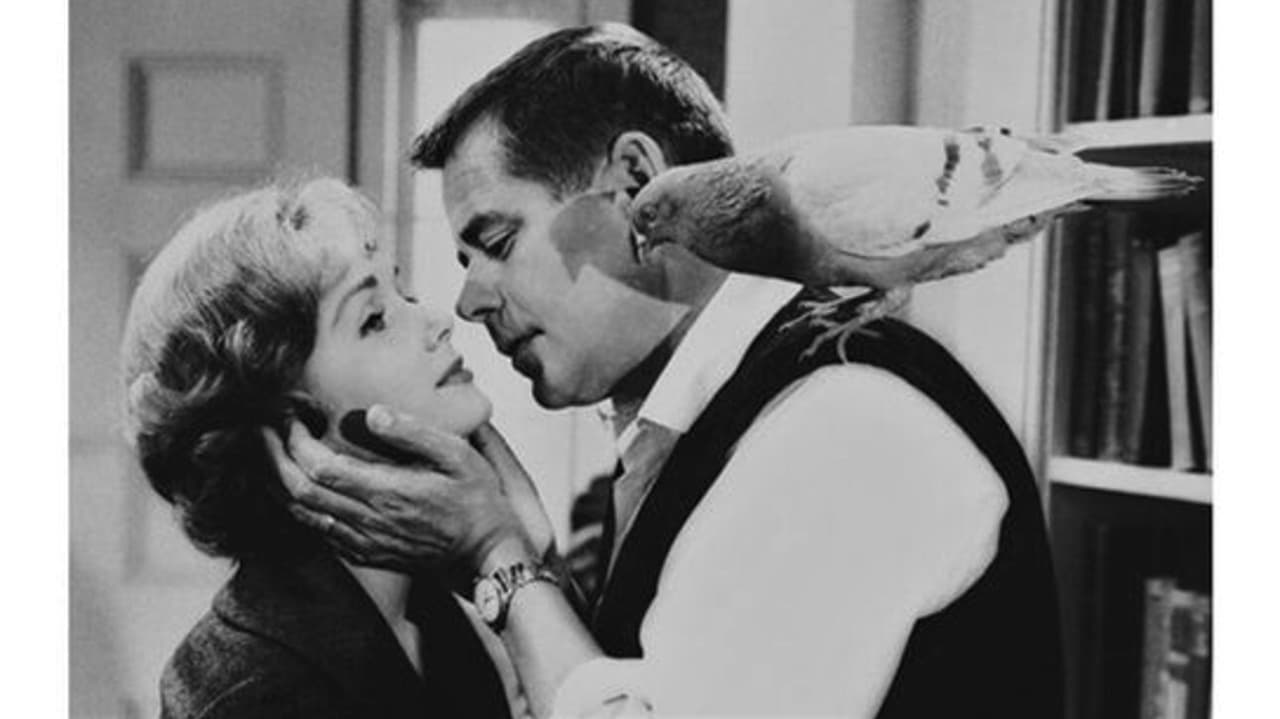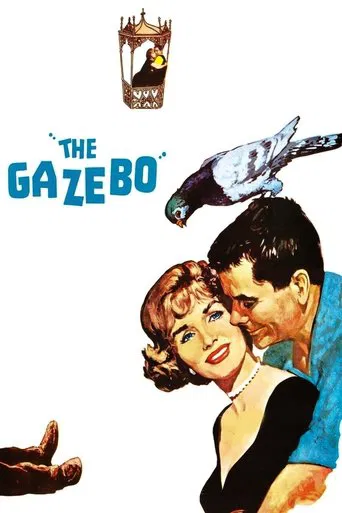

This is a bizarre comedy that seems to try very hard to be kooky--which is a very tough sell due to the darkness of the plot. A dark, dark film combined with kooky is a very, very hard sell! The film concerns a couple (Glenn Ford and Debbie Reynolds). Ford works like a dog and you soon learn that he's working so hard because he's paying off blackmailers--blackmailers that have nude photos of Debbie when she was younger. Now the idea of Debbie Reynolds posing naked is a very tough sell--it just doesn't seem possible. Eventually Ford is so fed up with the never-ending blackmail that he decides to kill the blackmailer and hide the body in the foundation of the new gazebo. But, while the killing seems to go off without a hitch, things only get worse after the evil deed was done.Killing, nude photos of Debbie and burying a body in the yard--all this is a very tough sell for audiences expecting to see a cute little film. While some of the film is a bit cute and even funny, the overriding black hole which is the plot is just too difficult to make funny! And, by trying so hard to make this a comedy, the film just doesn't quite work. It's interesting...but not all that great. A time-passer and a strange one at that.
... View MoreAs of this writing, Glenn Ford is still with us, living in retirement. He has never, except from his fans and fellow actors, received the recognition his honest acting abilities in drama or comedy have fully deserved. His performances in "Experiment In Terror" and "The Blackboard Jungle" and "3:10 To Yuma" fully show his firm handling of dramatic material. He was a superb psychotic villain in "The Man From Colorado". He held his own with Rita Hayworth and George Macready in "Gilda". And for comic gems let me suggest "The Rounders" (holding his own with Henry 0Fonda, Chill Wills, and his old film friend Edgar Buchanan), "Teahouse Of The August Moon", and this film. For some reason the New York Times film critics always slam "The Gazebo". I can't tell why. It may be because those comedies traipsing on dark matters like murder seem to need an element of elegance (in some quarters) to be rated highly. But how many "Kind Hearts And Coronets" or "Monsieur Verdoux" films can there be? THE GAZEBO is certainly bereft of elegant villains like Dennis Price and Charlie Chaplin, but it does draw us into the hero's real problems.Elliot Nash (Ford) is a hard-working producer, whose wife Nell (Debbie Reynolds) is an equally hard worker performer. Nash has been receiving blackmail threats from a man he has never met. The man is demanding an impossibly large sum of money for pictures he has of Nell that might hurt her career. Nash is forced, in his bumbling way, to consider the only alternative (short of a miracle) to take care of the blackmailer: he must kill him. So on a night that Nell is away from their suburban home, Nash (following a step-by-step plan he even wrote down and put into his desk's top draw) arranges to shoot and kill the blackmailer and to bury the body. He had originally intended to simply bury it in the back yard, but Nell has accidentally helped him here - it seems (for his birthday gift) she is installing an antique gazebo in the backyard, under the watchful workmanship of John McGiver. Ford drags the dead body (in an old bath curtain) into the backyard, and puts it into the foundation of the gazebo.The problems arise afterward. First, it turns out the police want to question him anyway regarding the blackmailer - it seems they found his body in his office, shot to death. They don't suspect Nash for this, but they are curious about why the blackmailer called him. Of course this leads to the issue - who is in the gazebo. Ford goes nuts trying to figure out who among his family and friends is missing. Secondly, it also brings up another matter. Elliot and Nell have a close friend, Harlowe (Carl Reiner), whom Elliot has always found a little annoying as Harlowe once was dating Nell. Now he's around prying into the relationship of Elliot and the dead blackmailer.Soon some others pop up, two goons (the leader is Martin Landau) wondering what happened to Dan - whom they knew was supposed to be visiting Elliot. Can he be the man in the gazebo? Is he the key to all this? The action of the jittery Ford is priceless, particularly in the scene where he shoots the visitor. An example: Nash has been thinking of doing some work with Alfred Hitchcock. Hitch calls (we never see or hear him) while Nash is wondering how to bury the dead man. Ford asks Hitch advise "for a plot he's working on" and Hitch helps out.The final ten minutes, when Ford is almost ready to throw himself on the mercy of the detectives (Reiner and Bert Freed, as a Lieutenant who literally louses up his own case), only to change strategies in a moment of clarity, are hysterical. I particularly hope you fully appreciate Freed's tag-line at the conclusion of the film.
... View MoreGlenn Ford is the producer of a television mystery series who attempts to protect his Broadway star wife (Debbie Reynolds) from a blackmailer--and decides to eliminate the blackmailer via a murder plot suggested by his own series. The result is a comic chaos involving a couple of gangsters, a peculiar pigeon, and the gazebo his wife is having built on their country property.Based on the play of the same name, THE GAZEBO strives for a mix of broad farce, screwball comedy, and sprightly sophistication--and by and large brings it off quite well. I have never been a great fan of Glenn Ford, but he manages both the broad physical comedy and the clever dialogue of this film with equal ease. Debbie Reynolds is also quite good in the role of the stage-star wife, and she and Ford have a surprisingly successful chemistry. Although the humor is more smile-and-chuckle than laugh-out-loud, THE GAZEBO is a well made, well acted, and quite enjoyable. Recommended.Gary F. Taylor, aka GFT, Amazon Reviewer
... View MoreGlenn Ford was always a solid, consistent performer, and although I haven't seen this movie since it was first run, I remember much of it. This was the movie that allowed Debby Renyolds to be an adult.If movies of the 50's were not of the Golden Age, they were at least Silver. This was a time when screenplays had actual plots.It was also a time that continued the wonderful practice of allowing supporting players like John McGiver to become celebrities through sheer talent. Players like he, and Thelma Ritter, and dozens of others I could name, but won't, were as responsible for good films as the Stars, and were allowed their moments to shine in the movie.I miss the Old Hollywood. I will tell you that in the last 10 years, I have gone to 4 movies- three of them LOR. The fourth was Gibson's the passion- and well made though it was, I think it's put me off movies for another 10 years, at least.
... View More